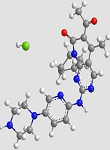|
|
|
Palbociclib - A Novel Therapy for Hormone-receptor-positive Breast Cancer
|
|
|
|
|
|
|
|
|
|

|
|
|
Ryan J. Lorenzo and Stephan C. Jahn
|
|
|
|
University of Florida
|
Department of Medicinal Chemistry and UF Health Cancer Center, UFL, Gainesville, FL 32610, USA
|
|
scjahn@ufl.edu
|
|
|
|
|
|
|
|
|
|

|
|
Palbociclib has emerged as a novel inhibitor of cyclin-dependent kinases 4 and 6 (CDK4 and CDK6). When activated by D-type cyclins, CDK4 and CDK6 phosphorylate proteins, the most important being retinoblastoma protein (RB1), which help to initiate the cellular transition from the G1 to the S phase. In hormone-receptor-positive breast cancer, cyclin D1 is overexpressed, thus driving the phosphorylation of RB1 by CDK4 and CDK6 and leading to increased cell proliferation. While most hormone-receptor-positive breast cancers are treated via endocrine therapy, some types are resistant to this treatment. Thus, by inhibiting CDK4 and CDK6 with extreme selectivity, palbociclib prevents the phosphorylation of RB1 and in turn arrests the cell in the G1 phase. In this research highlight, we will discuss a phase three trial paper from Turner et al. that assesses the efficacy of palbociclib, coupled with the estrogen receptor (ER) therapy fulvestrant, on patients with advanced hormone-receptor–positive, human epidermal growth factor receptor 2–negative breast cancer who had relapsed or progressed after being previously treated with endocrine therapy.
|
|
|
|
|
|
|
|

|
|